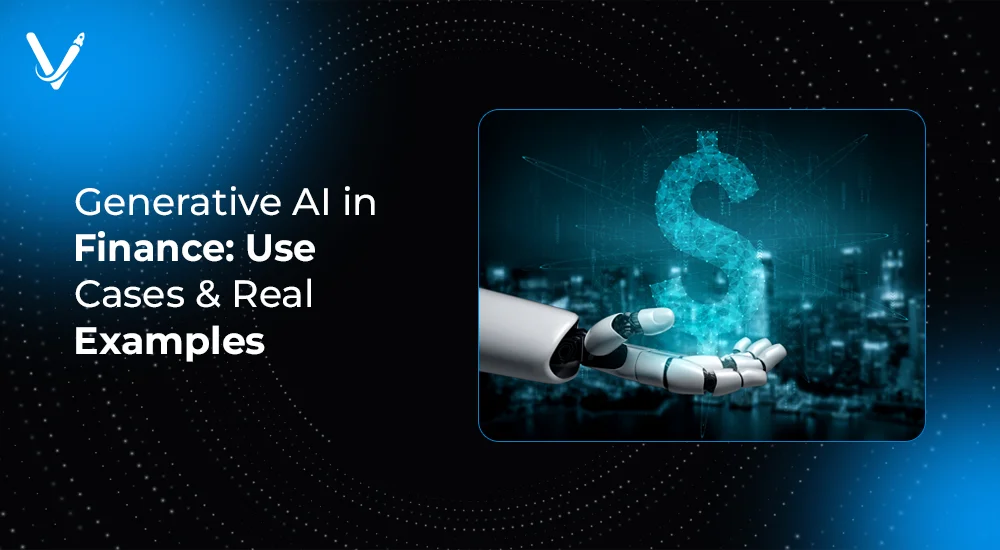Generative AI in Finance: Use Cases & Real Examples


- May 4, 2025
The financial industry stands at a pivotal moment. With the rapid evolution of digital technologies, financial institutions are increasingly embracing generative AI to maintain a competitive edge. This article delves deep into how generative AI is revolutionizing finance, exploring transformative use cases, real-world examples, and actionable insights that empower institutions to thrive in a dynamic environment.
Improving customer service, optimizing risk management, and creating new financial products are just a few areas where generative AI is unlocking unprecedented opportunities. In this comprehensive guide, we unpack the world of generative AI in finance, illustrating its impact and potential through real-world examples and strategies.
Generative AI refers to a class of artificial intelligence that creates new content, data, or solutions by learning patterns from existing information. In finance, this means AI models can generate trading strategies, financial reports, risk models, synthetic data, personalized customer interactions, and innovative financial products.
Unlike traditional AI, which primarily classifies or predicts, generative AI actively "creates" new outputs. This capacity enables organizations to simulate scenarios, predict behaviors, and generate novel strategies that were previously unimaginable.
Several factors make generative AI particularly impactful for the financial sector:
Preparing detailed financial reports is labor-intensive. Generative AI streamlines the process by:
Example: JPMorgan Chase employs natural language generation (NLG) technology to automate parts of its financial reporting, allowing analysts to focus on higher-value strategic analysis.
Modern consumers expect intelligent, tailored financial advice. Generative AI enables:
Example: Wealthfront, a leading robo-advisor, uses AI to generate personalized financial plans that adapt as clients' circumstances change.
Financial fraud remains a significant threat. Generative AI enhances fraud prevention by:
Example: PayPal's fraud detection models leverage synthetic transaction data generated by AI to improve their resilience against novel fraud patterns.
Generative AI empowers financial institutions to:
Example: Renaissance Technologies utilizes AI to generate and refine trading strategies at scale, contributing to its reputation for consistently high returns.
Traditional credit scoring methods are often limited. Generative AI expands credit risk assessment by:
Example: Zest AI enhances underwriting decisions by generating alternative borrower profiles, improving access to credit for underrepresented groups.
Privacy concerns and regulatory restrictions make accessing real customer data challenging. Generative AI mitigates these issues by:
Example: American Express uses synthetic transaction data to rigorously test fraud detection models while maintaining customer confidentiality.
Financial regulations are intricate and constantly evolving. Generative AI assists by:
Example: HSBC leverages AI to generate internal compliance documents, significantly reducing manual compliance costs and enhancing regulatory adherence.
COiN automates the review of commercial loan agreements, extracting critical clauses and reducing the manual effort traditionally required by legal teams. What once took thousands of hours now happens in seconds.
Goldman Sachs uses generative AI to create research notes, market predictions, and client reports. Their AI systems analyze thousands of data points and generate actionable insights for clients and internal stakeholders.
Mastercard's AI systems simulate cyberattacks to identify vulnerabilities before bad actors can exploit them. Generative AI predicts new attack vectors, strengthening the company's cybersecurity defenses.
The Aladdin platform combines data science, machine learning, and generative AI to monitor risk across trillions of dollars in assets, dynamically adjusting portfolios and forecasting stress scenarios.
By generating synthetic financial transaction data, American Express ensures its fraud prevention algorithms are continually trained on diverse datasets, improving detection rates without compromising user privacy.
Boosted Operational Efficiency: Financial firms save thousands of hours on tasks like document review, report generation, and compliance reporting.
Enhanced Personalization: Customers experience hyper-personalized products, services, and advisory support.
Superior Risk Management: Firms identify emerging risks faster and prepare more effectively for economic fluctuations.
Innovative Product Development: Generative AI enables rapid prototyping and testing of new financial products and services.
Regulatory Confidence: AI-generated compliance frameworks help firms stay ahead of changing regulatory landscapes.
Stronger Fraud Detection: Synthetic fraud scenarios enhance model training, making fraud detection systems more robust and adaptive.
Data Quality and Bias: Poor-quality training data can lead to biased models, impacting decision-making fairness.
Ethical Implications: Financial services must ensure that AI outputs are explainable, fair, and aligned with ethical standards.
Security Vulnerabilities: Synthetic datasets, if mishandled, can introduce vulnerabilities or privacy risks.
Regulatory Uncertainty: As AI regulations evolve, financial institutions must remain agile and proactive.
Talent Shortage: Building and maintaining generative AI systems requires specialized talent, which remains scarce.
Prioritize Ethical AI Development: Establish clear ethical guidelines for model development, deployment, and oversight.
Focus on Transparency: Develop explainable AI systems that regulators, customers, and stakeholders can understand.
Invest in Talent: Recruit and train cross-functional teams skilled in both finance and AI.
Start with Controlled Pilots: Begin with low-risk use cases before scaling AI applications enterprise-wide.
Maintain Regulatory Alignment: Stay ahead of regulatory changes by building compliance into AI models from the outset.
Leverage Partnerships: Collaborate with technology providers, consultancies, and academic institutions to accelerate innovation.
AI-Driven Financial Advisory Co-Pilots: Human advisors will increasingly partner with AI systems that generate real-time client insights and recommendations.
Real-Time Regulatory Reporting: AI will generate compliance reports dynamically, adjusting to regulatory updates in real-time.
Hyper-Personalized Financial Ecosystems: Banking and investment platforms will dynamically adapt product offerings based on real-time customer behavior.
Quantum Computing and AI Fusion: Quantum-enhanced AI models will revolutionize risk modeling, trading, and financial forecasting.
Synthetic Ecosystem Simulations: Firms will simulate entire economic environments using generative AI to test investment strategies and policy impacts.
Generative AI is no longer just a futuristic idea; it is a present-day catalyst for financial industry transformation. By creating new insights, simulations, and strategies, generative AI empowers financial institutions to operate smarter, faster, and more customer-centric.
At Vasundhara Infotech, we help financial institutions unleash the full potential of generative AI. Our AI-powered solutions are designed to accelerate innovation, streamline operations, enhance risk management, and deliver exceptional client experiences. Partner with Vasundhara Infotech today and take the first step toward a smarter financial future.
Copyright © 2026 Vasundhara Infotech. All Rights Reserved.
